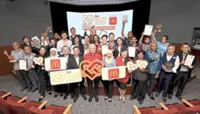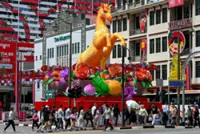THE Star Golden Hearts Award (SGHA) and Gamuda Inspiration Award (GIA) – collaborations between The Star Foundation and Yayasan Gamuda – recognise outstanding individuals or groups for their exceptional contributions across several realms, including supporting indigenous communities, raising awareness and funds for autism, contributing to wildlife conservation, providing education to underprivileged students, and other impactful initiatives.
SGHA annually honours 10 outstanding winners, while the GIA is awarded to at least one exceptional social changemaker among the 10 winners, with an additional grant from Yayasan Gamuda to further propel their efforts.
Chuah Ee Chia and Dr Billy Tang, representatives of past GIA winners Iskul Sama diLaut Omadal (2022) and PWD Smart FarmAbility (2020) respectively, share insights into their programmes – underscoring their ongoing commitment to making a positive impact on lives and the environment.

Uplifting Bajau Laut children
Founded in August 2015, Iskul has been on a mission to provide basic literacy to stateless Bajau Laut children in Omadal, Semporna.
Operating with limited resources, co-founder Chuah Ee Chia vividly describes the early days: “All we had were passionate Malaysians and stateless children – both eager to teach and to learn. Classes were initially held on the verandah or kitchen, taught by Malaysian schoolchildren known as Mastal Arikik, or ‘little teachers’.”
In her research for her Master’s thesis, Chuah uncovered a significant language barrier, with many stateless Bajau Laut children lacking proficiency in Bahasa Malaysia – hindering communication and perpetuating dire living conditions.
Stateless and without documentation, these children face the fear of detention – limiting their access to basic needs like water, healthcare and education.
The 2020 national census underscored the challenges, revealing 156 stateless households, over 200 unschooled children, and impoverished living conditions.
“The children required their basic needs met, including nutrition, access to water and medical needs, among others,” says Chuah about the holistic approach taken by Iskul.
ALSO READ: JUDGING THE HEART OF CHANGE
“Once these were addressed, we expanded to work on other blocks like environment, content creation/story-telling, digital literacy, and creating a social enterprise for sustainable income.
“We were also creating a space where children from both communities could interact, to improve their relationship and promote inclusivity.”
Recognising the inefficiencies of their early teaching methods, Iskul improved their system by putting in more structure. This included registering as a society, seeking permission to build Pondok Iskul, and introducing a full-time teacher in 2020.
Chuah further believes in the importance of a whole-of-society approach for the school, which has now transformed into a community centre: “Iskul as a community initiative cannot do it on our own. A collaborative approach is needed to give these stateless children a chance at life.”

In reflecting on the past three years, Chuah credits the support from various entities: “The last three years have shown how far we can go when we have the support from our funders – local foundations and international bodies, NGOs, private sectors, government agencies, local governments and interested individuals.
“Seventy-nine percent of our students can read Bahasa Malaysia now, and 25% are fluent in reading and intermediate in speaking,” Chuah proudly shares.
An administered confidence survey revealed positive outcomes, with 70% of students gaining confidence.
Chuah highlights the students’ progress: “Students feel empowered to organise activities and propose solutions to problems on the island such as trash removal. The children say it’s a joy to be able to contribute positively and put to use their newly-acquired arithmetic and communications skills.”
Since its inception, Iskul has bestowed the gift of literacy upon over 80 stateless children.
Notably, three Iskul students graduated to become Mastal Arikik themselves – paying it forward by teaching younger students.
Empowering 24 stateless and Malaysian youth in Omadal through teaching training and experiences, Iskul successfully organised numerous community development projects.
Additionally, 10 youths, comprising five stateless and five Malaysian individuals, acquired video production and filmmaking skills, and have produced a total of 21 videos since February. One video which addresses the campaign to stop glue sniffing went viral on Iskul’s social media platforms.
In terms of community health, Iskul has made a substantial impact by providing nutritious meals to 45 children and introducing supplements to 20 pregnant and nursing mothers, along with 30 children.
The Iskul Mini First Aid Centre delivered first aid and medication at least twice weekly, recording 72 treatments in a 60-day span from July to August 2022.
Furthermore, 30 health ambassadors were empowered to bring hygiene practices to their homes, influencing 50 people from 24 households.
In environmental initiatives, 1,255.5kg of plastic waste was saved from being disposed into the sea, from January 2022 to June 2023.
Thirty-three households participated in Iskul’s Pilot Waste Management Project, learning proper plastic waste disposal practices.
Additionally, 120 households enhanced their water access by receiving free water tanks for rainwater storage, thereby eliminating the need to purchase water.
These are just a handful of its success stories. Nonetheless, Iskul continues to face several challenges in its operations.
Navigating legal requirements poses a significant hurdle. While the initial registration under the Registrar of Societies Malaysia allowed them to secure grants, the current need to register with the Education Ministry and obtain approvals from various government agencies involves lengthy paperwork.
A cultural challenge arises concerning underage marriage within the community, impacting the growth of Mastal Arikik. Nurturing Mastal Arikik is complex, given the children’s vulnerable backgrounds. Instilling confidence in them to aspire for high ambitions proves challenging, compounded by their stateless status hindering exposure to external educational opportunities.
Addressing malnutrition, medical needs, and lack of clean water are ongoing challenges. Iskul responds by providing additional meals, medical assistance, and collaborating to enhance their mini-first aid centre into a community health centre. Initiatives include turning to the Malaysian Society for Harm Reduction (MSHR), and the Centre of Industry Relations and Network (CiRNeT) for support.
Despite these obstacles, Iskul remains committed to overcoming challenges and making a positive impact on the stateless community in Omadal.
According to Chuah, Iskul’s goals for the future include digital literacy for its students as a pathway to alternative income, vocational training to set up a social enterprise for Iskul so it will be able to generate income for Iskul and the community, and setting up a production house.
“Our team was severely burned out and under-resourced last year. Then we won the Star Golden Hearts Award and Gamuda Inspiration Award, which gave us a breather to pause, reflect and re-strategise.

“The GIA fund is flexible and we can use it wherever we need. It has helped us to hire more staff; repair our Pondok Iskul’s worn-out floor, roof and supporting pillars; replace the oft-broken bridge (main access for the stateless communities to the island) with a concrete bridge by facilitating a gotong-royong between both stateless and Malaysian communities; and also allowed us to build a proper room for our mini-first aid centre.
“More than just the award grant, we’re grateful for Yayasan Gamuda’s team support in Iskul’s work. For instance, Gamuda engineers helped us in the design and costing for the upcoming construction of a digital lab.
“This important work and credentials from Gamuda has helped us secure a grant from the Acronis Foundation to build a digital lab for our students,” Chuah shares.
Empowering the disabled
PWD Smart FarmAbility, spearheaded by the Dr Billy Tang – a paraplegic farmer and acclaimed agriculturist – stands as a beacon of empowerment for Malaysia’s disabled community.
This socially impactful enterprise, accredited by the Malaysian Global Innovation & Creativity Centre (MaGIC), is on a profound mission – to combat food insecurity and malnutrition simultaneously through regenerative agriculture.
In Tang’s words, the enterprise aims to make nutritious food and essential food-growing skills accessible not only to people with disabilities but also to various marginalised groups, including B40, homeless shelters, drug rehabs, prisons, single mothers, indigenous people, and others facing similar challenges.

Incorporated as a social enterprise accredited under the Entrepreneur Development and Cooperatives Ministry, PWD Smart FarmAbility Enterprise and PWD Smart FarmAbility Sdn Bhd channel their efforts into leveraging regenerative agriculture principles.
Tang passionately emphasises their vision, stating: “Soil health is human health and the wealth of the nation.”
The mission, succinctly put, involves farming for the underprivileged and arming them with the knowledge to achieve self-sustainability – recognising that sustainability equals survival.
The core team driving PWD Smart FarmAbility reflects diversity, inclusivity and passion. This dedicated group, hailing from various backgrounds, collaborates to decentralise food systems, and empower households, special needs schools and communities.
Tang, who recently published a book titled Journey from Wheels to Farm which garnered the coveted World Humanitarian Drive (WHD), UK, London Regal British Award in 2022, envisions the poorest individuals gaining the ability to continuously feed themselves and eventually becoming contributors to their community’s food and health.
Tang’s innovative products, such as the vegetable Hopebox Terrarium and the Organic Soil-U-tion Aquaponics Satellite Farm System, exemplify the enterprise’s commitment to sustainable solutions.
The self-watering, regenerative Hopebox Terrarium system, and the Soil-U-tion satellite farm system provide avenues for households to engage in agriculture, even without prior experience.
The enterprise’s impactful initiatives have garnered local and international acclaim, including a recent ESG Pioneer Award with SDGs – organised by the Penang Green Council, Universiti Sains Malaysia, and Yayasan Amal TYT Pulau Pinang.
Tang’s leadership and innovative solutions earned the Star Golden Hearts Award and Gamuda Inspiration Award in 2020.
Since its inception, over 6,000 terrarium boxes and 30 Soil-U-tion satellite farms have been deployed throughout Peninsular Malaysia. These installations reached special needs schools, B40 families, centres for persons with disabilities, Orang Asli communities, orphanages, and old folk homes – positively impacting individuals who fit the profile.
Each vegetable Hopebox Terrarium which harnesses soil microbiology can yield between 1kg and 2kg of vegetables per month, providing a sustainable source of nutrition.
The Soil-U-tion satellite farm is expected to produce approximately 8kg to 10kg of vegetables per month, with an additional 40kg-50kg of fish protein per cycle per annum.
Looking ahead, Tang envisions an expanded impact by establishing partnerships with local organisations, governments and international stakeholders. By collaborating with like-minded individuals and institutions, PWD Smart FarmAbility aims to create significant and lasting change for communities.
A key focus for the future involves integrating financial inclusion into school programmes.
Tang underscores the importance of financial literacy classes, offering children the opportunity to learn, budget, save and spend. This initiative aims to impact children’s financial stability, self-esteem, relationships and overall quality of life as they transition into adulthood.
In a strategic partnership with E2E Academy Sdn Bhd, an international financial literacy certified institute, PWD Smart FarmAbility seeks to enhance its impact.
Tang envisions comprehensive growth – integrating innovative farming techniques, sustainable agricultural practices and empowering underserved communities through micro-credentials, vocational training and entrepreneurship opportunities.
He also shares exciting collaborations, such as the partnership with Vera Bella Enterprises Limited Company for sustainable protein-based ice cream and cookies, including the Tilapia Ice-Cream product called Daerrys in the Philippines.
Despite challenges along the journey, he emphasises the importance of perseverance: “It was with utmost respect and humility that PWD Smart FarmAbility was awarded the Star Golden Hearts Award and Gamuda Inspiration Award 2020. It has greatly inspired and lifted me beyond my wildest dreams to continue expanding my work.“
The enterprise stands as a testament to the transformative power of regenerative agriculture, creating a positive ripple effect in communities and beyond.
In his parting statement, Tang encapsulates the essence of PWD Smart FarmAbility’s mission: “Agriculture is no longer about farming but about feeding. Good health and nutrition can save a nation.“





